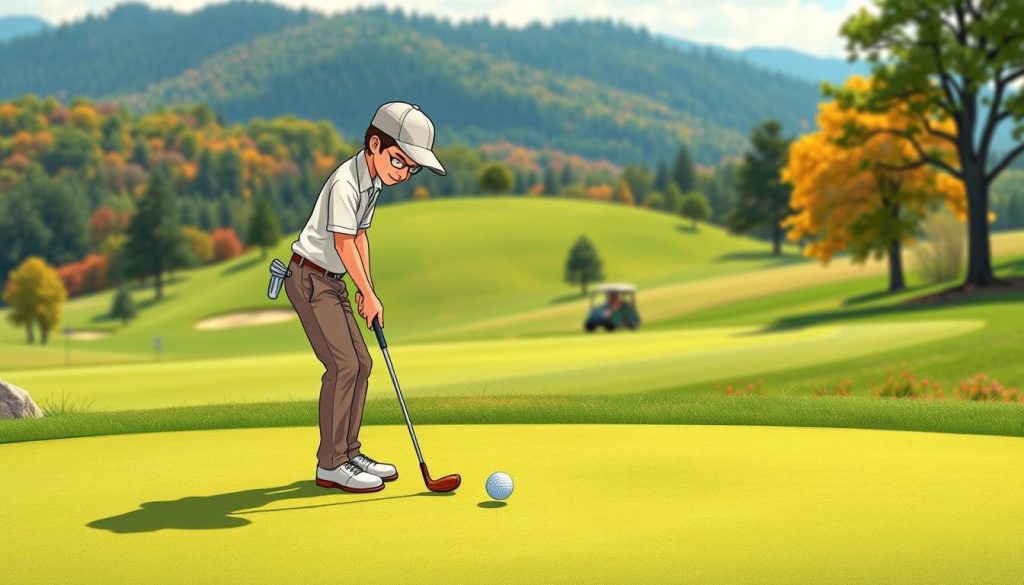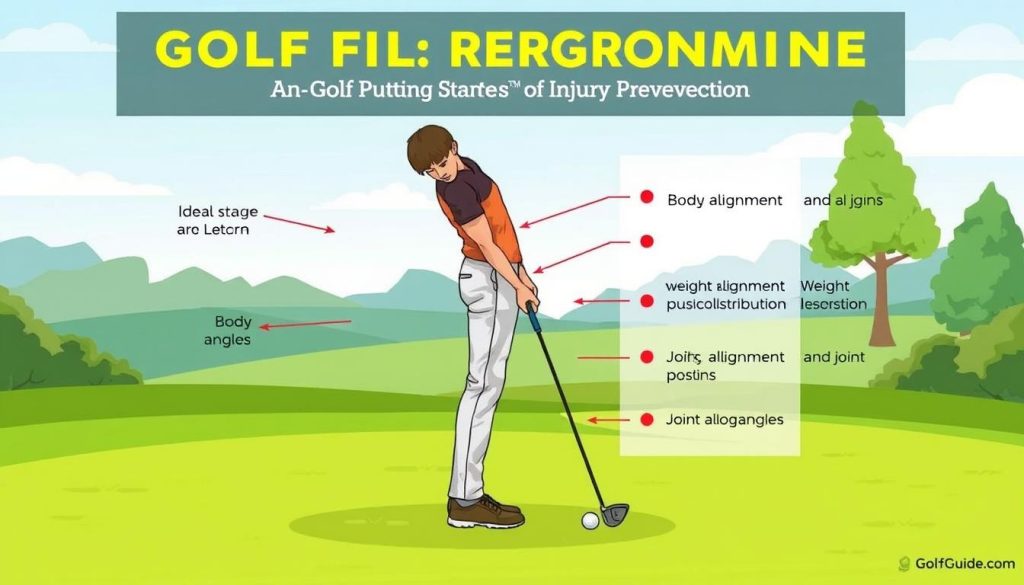Mastering your putting technique is key to lowering your golf scores. A solid golf stance is the base of successful putting. This guide will help you improve your putting stance, focusing on key elements like optimal ball position and weight distribution.
Your putting stance affects nearly half of all strokes in a round. By adjusting your body alignment, feet position, and eye line, you’ll get a more consistent stroke. A natural stance helps prevent unwanted movements and reduces muscle tension, leading to a smooth putt.
Professional golfers often use high-quality putters from brands like Scotty Cameron, Odyssey, and TaylorMade. These putters, available in blade and mallet styles, offer superior feel and forgiveness. When picking a putter, think about length, weight, and loft to match your putting style.
Key Takeaways
- A proper putting stance is essential for lowering scores
- Focus on body alignment, feet position, and eye line
- Maintain a natural, comfortable stance to reduce tension
- Choose a putter that complements your putting style
- Practice regularly to improve your putting technique
Understanding the Fundamentals of Putting Biomechanics
Putting biomechanics are key to golf success. Learning these basics can greatly enhance your putting skills. We’ll look at body alignment, golf posture, and core stability.
Body Alignment and Weight Distribution
Right body alignment is crucial for consistent putting. Stand with your feet a bit wider than your hips for stability. Try to keep your weight evenly distributed between your feet during the stroke.
Natural Posture Mechanics
Having the correct golf posture is essential for a good putt. Your spine should be at an angle of 113 to 123 degrees for best results. Bend at your hips, not your waist, for a natural stance.
This stance makes your stroke smoother and more controlled.
Core Stability in Putting
Core stability is crucial for balance and control in your putting stroke. Engage your core muscles to create a solid base. This stability reduces unnecessary body movement, making your putts more consistent.
Practice exercises to strengthen your core and improve your putting.
- Putter face angle at impact influences ball direction 5 times more than swing path
- Ideal ball launch angle for putts is around +2 degrees
- Most putters have approximately 4 degrees of loft
- Hands should be slightly ahead of the putter at impact for added stability
By focusing on these biomechanics, you’ll improve your putting technique. Remember, consistency is key. Regular practice will help you master these putting elements.
Putting Stance Optimization Guide
Mastering your putting setup is key to improving your golf game. Let’s look at the main parts of a good putting stance. This will help you make more putts.
Finding Your Optimal Ball Position
Your ball position is crucial for success in putting. Put the back of the ball in the middle of your stance. This lets you hit the ball at the bottom of your swing, using your putter’s loft for a smooth roll.
Stance Width Considerations
Your stance width should be about two inches wider than your natural stance. This wider base helps you stay balanced and in control. Brad Faxon recommends matching your putter length to your natural stance for better results.
Eye Line Positioning
Proper eye alignment is key for accurate putting. Place your eyes vertically above the target line. This helps you see the right path to the hole and improves your aim. Top putters like Tiger Woods also rely on instinct and feel, not just face alignment.
| Element | Optimal Position | Benefit |
|---|---|---|
| Ball Position | Middle of stance | Smooth roll initiation |
| Stance Width | 2 inches wider than neutral | Improved stability |
| Eye Alignment | Vertically above target line | Enhanced accuracy |
Remember, putting is a personal skill. Try out these tips to find what works best for you. Practice often to build muscle memory and boost your confidence in your stance.
The Science Behind Face-On Putting Technique
Face-on putting is a new way to putt that’s both legal and easy. It keeps the clubface straight with the target line. Let’s explore the science behind this fresh approach.
The GP putter is made for face-on putting. It helps you move naturally and consistently. This design makes it easier to put without making many adjustments.
Face-on putting changes how you move compared to old ways. It uses shoulder rotation, free arms, and a putter that moves with your arms. This creates a smooth motion that improves your aim and control.
| Aspect | Conventional Putting | Face-On Putting |
|---|---|---|
| Grip | Palms opposite each other | Modified for side stance |
| Body Alignment | Parallel to target line | Perpendicular to target line |
| Stroke Motion | Rocking shoulders | Pendulum-like arm swing |
| Putter Face | Varies during stroke | Consistently aligned |
Face-on putting makes controlling distance easier. Unlike old methods, where you adjust your stroke for distance, this way feels more natural. The GP putter’s design helps you judge and make putts up to 20 feet better.
Mastering the Side Saddle Putting Method
Side saddle putting is a new technique catching the eye of golfers wanting to get better. It gives a different view on how to stand while putting, which could make you better on the green.
Benefits of Side Saddle Approach
The side saddle method can really help with putting accuracy. PGA tour stats show a big difference in successful putts from 6 to 10 feet between the best and the rest. This method might help you bridge that gap and lower your score, since putting is a big part of the game.

Technical Setup Requirements
To do side saddle putting right, stand beside the putt line, facing the hole. It’s important to line up your body and putter correctly. Many golfers do well with a GP putter, priced at $329, which fits this style well. Plus, side saddle putting is totally legal in tournaments, so you can use it without worry.
Common Side Saddle Mistakes
When trying side saddle putting, watch out for these common errors:
- Improper weight distribution
- Misalignment of the putter face
- Inconsistent stroke path
Practice is key to mastering this technique and avoiding these pitfalls. With hard work, you might see big improvements, like the 40% difference in putt performance at an 8-feet range seen by top golfers.
Advanced Putting Stance Adjustments for Different Green Conditions
Learning to read greens and adjust your putting stance is crucial for better scores. Each green condition needs a specific stance to keep your shots accurate and controlled. Let’s look at how to change your putting based on the slope and green speed.
For uphill putts, lean forward a bit to fight the slope. This keeps your stroke steady and prevents the ball from falling short. On downhill putts, move your weight back to control speed and avoid overshooting.
Green speed affects your stance. On fast greens, stand wider for more stability. This lets you make smaller, controlled movements. On slower greens, a narrower stance can give you the power to reach the hole.
Regular practice on the putting green will improve your skills on different courses. At Putting World, coaches use advanced tech for putting evaluations. They help golfers fine-tune their techniques.
Using tools like the Pro Path Putting Mirror can boost your accuracy. It aligns your shoulders with the target line and promotes a consistent stroke. Place it 5 to 6 feet from the hole to improve your form.
Developing a pre-shot routine can also help. It reduces anxiety and builds consistency on the greens. By adding these advanced putting stance adjustments to your game, you’ll handle different greens better and improve your putting.
Ergonomic Considerations in Putting Stance Development
Golf ergonomics is key to a good putting stance. It helps you play better and stay injury-free.
Injury Prevention Techniques
To avoid injuries, keep your spine straight and grip lightly. This eases pressure on your back, wrists, and forearms. Stretching regularly keeps your muscles flexible and lowers injury risk.

Long-term Stance Sustainability
For a lasting putting stance, practice regularly and listen to your body. Keep your balance and alignment steady. Strengthening your core and lower body boosts stability and endurance.
Physical Limitations Adaptations
If you face physical challenges, adapt your putting stance. You might adjust your stance width, use special gear, or try new putting methods. A golf pro or physical therapist can help find the right adjustments for you.
| Ergonomic Consideration | Benefit | Implementation |
|---|---|---|
| Neutral spine position | Reduces back strain | Maintain natural curve in lower back |
| Light grip pressure | Prevents wrist and forearm tension | Hold putter with relaxed hands |
| Regular stretching | Improves flexibility and reduces injury risk | Perform golf-specific stretches daily |
| Stance adaptations | Accommodates physical limitations | Adjust width or use specialized equipment |
By using these ergonomic tips, you can enhance your golf game. You’ll also keep your body healthy and enjoy playing more.
Performance Enhancement Through Stance Refinement
Improving your putting stance is crucial for better golf. A well-optimized stance can lead to lower scores. Let’s explore how to fine-tune your stance for better results.
Consistency is key in golf. Make your setup routine a habit. Use alignment aids to ensure your stance and putter face are right. This will help you make more accurate putts.
Try small changes to find your perfect stance. Adjust your stance width or ball position a bit. See how these changes affect your putts. Keep track of what works best for you.
Regular practice on stance can greatly improve your putting. Set aside time each week for stance practice. This effort will boost your overall golf game.
Using putting training aids can help refine your technique and stance. These tools give instant feedback, helping you correct your stance quickly. A refined stance means better performance on the green.
| Stance Element | Impact on Performance | Practice Tip |
|---|---|---|
| Alignment | Improves accuracy | Use alignment sticks |
| Ball Position | Affects distance control | Experiment with forward/back positioning |
| Stance Width | Influences stability | Try narrow and wide stances |
By focusing on stance refinement, you’re on the path to success. A solid putting stance leads to consistent results and lower scores. Keep practicing, stay patient, and watch your putting improve.
Training Drills for Stance Improvement
Mastering your putting stance is key to lowering your golf scores. Let’s look at some drills to boost your balance, alignment, and muscle memory on the green.
Balance Development Exercises
Try the one-foot putting drill to improve stability. Make putts while standing on your lead foot. This strengthens your core and boosts balance.
Phil Kenyon, who coached players to four Major Championships, suggests practicing with your eyes closed. It enhances your balance sense.
Alignment Practice Methods
Use alignment rods or string lines for visual feedback. The gate drill, loved by Justin Rose and Tommy Fleetwood, is great for an accurate start line. Place two tees 5cm apart, 12 inches from your ball.
This setup helps you refine your alignment skills. It offers a 0.75-degree accuracy level.
Muscle Memory Building
Consistency is crucial for building muscle memory. Set aside specific times each week for putting practice. The ladder drill is excellent for reinforcing proper techniques.
Start with short putts and gradually move back. Focus on maintaining consistent posture and alignment. Henrik Stenson scored 145ft in a similar drill, showing regular practice’s effectiveness.
FAQ
What is the ideal weight distribution for a putting stance?
How wide should my putting stance be?
Where should I position the ball in my putting stance?
What is face-on putting, and is it legal?
How can I adapt my putting stance for different green conditions?
What are some ergonomic considerations for my putting stance?
How can I improve my putting performance through stance refinement?
What drills can I use to improve my putting stance?
How does core stability affect my putting stroke?
What is the proper eye alignment for putting?
Source Links
- https://skillest.com/blog/master-the-art-of-golf-putting-a-comprehensive-guide-for-beginners/
- https://face-on-putting.com/basic-setup/
- https://www.elitegolfacademies.com/blog-articles/putting-mastery-series-01-unlocking-the-secrets-of-putting-setup-fundamentals
- https://golfinsideruk.com/putting-technique-the-putting-stroke-explained/
- https://golfpartnerusa.com/blogs/club-reviews/mastering-the-art-of-putting-a-comprehensive-guide-to-setup-and-technique?srsltid=AfmBOorbUpGTLyQAt1NjnLecrq-oyTkuZic7zAnDOBH9eju2LFdNcL1y
- https://skillest.com/blog/putting-like-brad-faxon-tips-to-improve-your-putting-stroke/
- https://www.golfzongolf.com/blog/technology/the-art-of-putting-in-golf-a-comprehensive-guide
- https://www.pgaplay.co.uk/learn/the-definitive-guide-to-mastering-the-art-of-putting/
- https://rotaryswing.com/golf-instruction/putting/perfect-putting/perfect-putting-technique-stroke
- https://canada.humankinetics.com/blogs/excerpt/putting-techniques?srsltid=AfmBOooOC3eQUpRXf1nCeriwg9SqZdiz1r5jaibWBJTvPPfcswh77NCh
- https://rotaryswing.com/golf-instruction/putting/release-putter-face
- https://side-saddle-putting.com/how-to-putt/?srsltid=AfmBOop5l-fUijLUjMChtdoVHMQoAUXHtuwmvEaSQrhl8aGEkCyO47C8
- https://side-saddle-putting.com/video-basic-setup-for-the-side-saddle-putting-stroke/?srsltid=AfmBOorNaZmPvHnyeCatOGfIj4c7ObXdhs2VnL4B2MRHTRsqq0hiB_Js
- https://puttingworld.com/putt-for-par/
- https://back2basics.golf/blogs/news/improve-your-putting-with-the-pro-path-putting-mirror?srsltid=AfmBOooh18VDKppmShHSWaaLDTO4tB7XcyDJcuJzw1wY8trhTWPhgqLB
- https://www.dentalproductsreport.com/view/optimizing-ergonomics-a-guide-to-creating-a-healthy-work-environment-for-dental-hygienists
- https://safetyculture.com/topics/ergonomics-safety/
- https://publichealth.tulane.edu/blog/workplace-ergonomics-safety/
- https://skillest.com/blog/mastering-the-follow-through-in-your-golf-swing/
- https://scotthughes.biz/forums/viewtopic.php?f=114&t=520377
- https://totalperformancept.com/golfing-at-your-peak-enhancing-strength-and-precision-with-therapy/
- https://www.todays-golfer.com/features/instruction-features/2020/september/phil-kenyon-golf-putting-tips/
- https://www.pantherrungolfclub.com/blog/52-how-to-perfect-your-putting-practice-at-home


